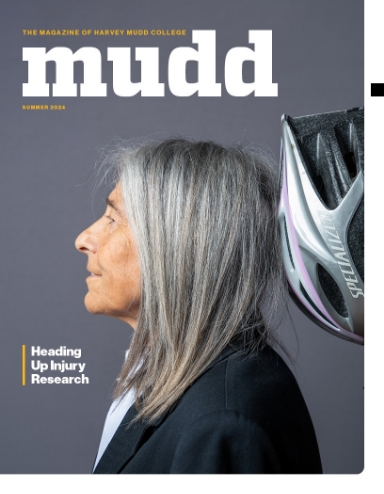Harvey Mudd Welcomes New Faculty for 2024–2025
July 3, 2024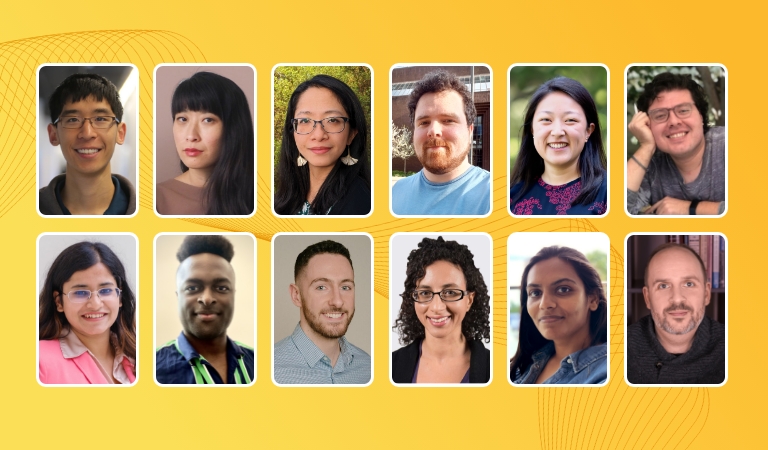
Harvey Mudd College welcomes 12 teachers/scholars—including three alumni—to campus this academic year. They will join 104 faculty colleagues charged with educating future scientists, engineers and mathematicians and inspiring them to become passionate problem solvers who understand the impact of their work on society.
Chemistry

Colm Healy joins the faculty after serving as a visiting assistant professor for the past two years. As a chemist with interests at the interface of physical, inorganic and materials chemistry, Healy uses materials chemistry to tackle climate change, energy storage and conversion, and renewable fuels. In his Hybrid Materials Chemistry Lab (HMC@HMC), researchers examine organic-inorganic hybrid materials, which combine some of the properties of traditional organic plastics with traditional inorganic glasses. By understanding phase changes in these materials, they hope to begin manipulating the physical properties of their materials. By introducing catalytic and/or conductive behavior into their materials, they will develop new materials for use in batteries, energy storage and production of renewable fuels. Healy received his PhD from Trinity College Dublin in Ireland and was a postdoc at the University of Canterbury in Christchurch, New Zealand; at Kyoto University in Kyoto, Japan; and at the University of Limerick in Limerick, Ireland.
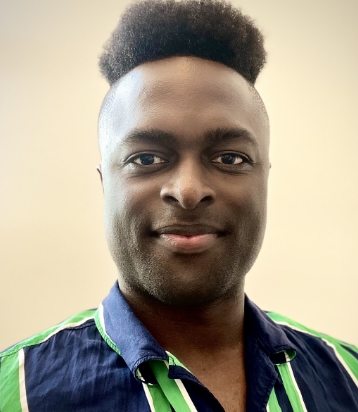
Maduka Ogba utilizes computational chemistry methods and high-performance computing to study catalytic reactions. The goal of his research group is to gain a molecular-level understanding of how catalysts activate substrates to form products and then develop simple and practical predictive models. His work has led to insights in several different areas of scientific and societal interests, including: (1) how bacterial pathogens sense biological oxidants in animal hosts and (2) how to use inexpensive, earth-abundant, and environmentally sustainable salts to convert environmental pollutant molecules into useful drugs and functional materials. Ogba’s team emphasizes scientific communication to develop critical skills that are transferable to any industry. He obtained his PhD in chemistry from Oregon State University, completed a postdoctoral fellowship at Pomona College and has served as a faculty member at Chapman University.
Computer Science

Jonathan Chang ’17 focuses on finding ways to promote healthier interactions in online communities. He approaches this problem both from a technical perspective—developing new algorithms and computational models to characterize and detect behaviors that are harmful to online communities—and a social perspective—exploring how such technologies can best be leveraged to create tools and policies with a positive impact. His work has been covered in popular media outlets, including NPR, MIT Technology Review and The Verge. Chang received his PhD from Cornell University and served as a data science fellow with the Cornell Center for Social Sciences.
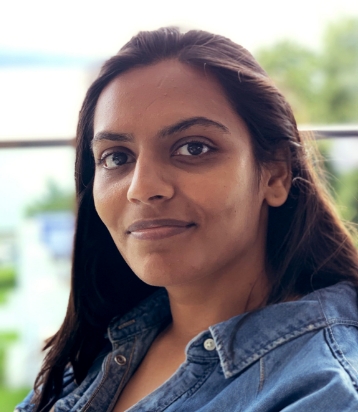
Vidushi Ojha ’17 is focused on broadening participation in computing by examining the institutional policies and classroom practices that foster students’ learning and well-being. Her research affords students an opportunity to learn a variety of qualitative and quantitative skills while working on topics directly relevant to their own experiences. Ojha was a software engineer for two years after college before beginning a PhD, which she received from the University of Illinois at Urbana-Champaign.
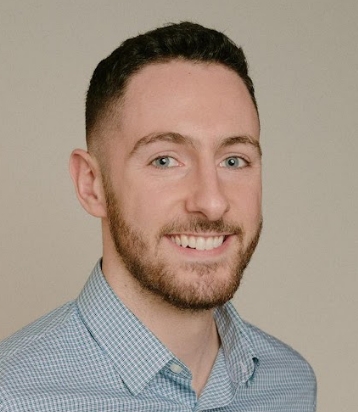
Tim Randolph has research interests that intersect computer science and mathematics and focus on using new mathematical tools on hard problems in exact and parameterized complexity. In addition to work in algorithms, he has published peer-reviewed research on cryptography, mathematics, management science and computer science education. He has a special interest in promoting equity and inclusion in computer science. Randolph received his PhD from Columbia University.
Engineering

Marissa Lee ’18 joins the Department of Engineering after completing her PhD in mechanical engineering at Stanford University. There, she was a Stanford Data Science Scholar and a leader of the Mechanical Engineering Women’s Group. As a researcher in the Neuromuscular Biomechanics Laboratory, she collaborated with clinicians nationwide to enhance patient mobility. She has taught and developed courses in biomechanics and coding for undergraduate engineering research, and she organized an annual seminar highlighting post-graduation pathways. Lee looks forward to bringing biomechanics and data science experience—which she further developed with the Philadelphia Phillies, a Major League Baseball team—to establish a research group at Harvey Mudd that studies human mobility and performance and will focus on quantifying and improving movement in natural environments, like the home or the soccer field, and uncovering relationships among bone, injury and treatment outcomes.
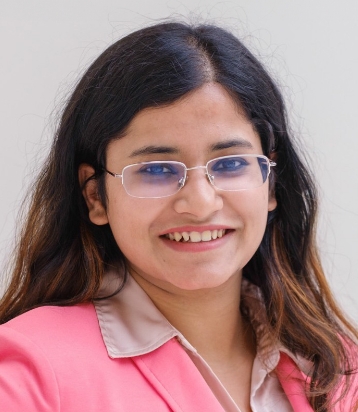
Adyasha Mohanty has designed algorithms for improving the localization of autonomous systems in challenging environments and under challenging dynamics using AI and physics-based models, sensor fusion, and principles from information theory. She seeks to design autonomous systems that function safely in the most unpredictable scenarios while bridging the gap between theoretical principles and practical implementations. She looks forward to working with students to extend these methods to space and aerial missions, and testing these algorithms on real-world platforms. Mohanty has held leadership roles in the American Institute of Aeronautics and Astronautics and Women in Aero Astro, and has mentored summer REU, community college and first-generation students. Mohanty has a PhD in aerospace engineering from Stanford University.
Hixon Center for Climate and the Environment/Biology
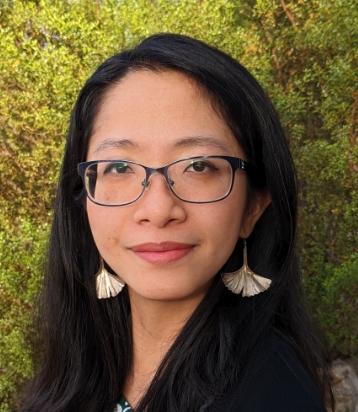
Jessica Guo is a plant ecophysiologist and data scientist who studies plant-environment interactions under extreme climate, focusing on drylands subject to potentially lethal combinations of heat and drought. Guo’s scholarship is motivated by observing climate change impacts, even on drought-tolerant desert plants. She blends her passion for reproducible workflows and Bayesian modeling with expertise in field instrumentation, time series data and plant hydraulics. She is co-principal investigator of an NSF-funded Research Coordination Network that aims to build a robust database of plant water potential and spur synthetic research across disciplines such as plant ecophysiology, remote sensing and ecosystem modeling. Guo received her PhD in biology from Northern Arizona University and was a postdoc at University of Utah and University of Arizona.
Humanities, Social Sciences, and the Arts
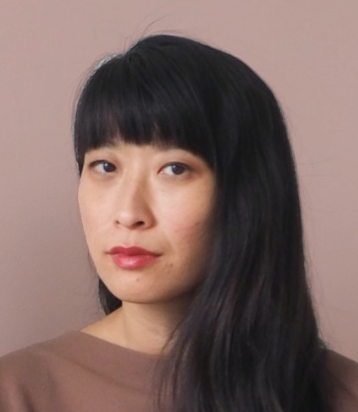
Jia Yi Gu, an architectural curator, scholar, designer and educator, works at the intersection of art and architecture. Her research focuses on histories of knowledge production and display practices in art and architecture. She is director and curator of MAK Center for Art and Architecture and has served as director of Materials & Applications, a Los Angeles-based project space for experimental architecture. She co-founded the architecture studio Spinagu in 2016 with Maxi Spina. Gu holds a master’s of architecture at UCLA. Her doctoral work investigates the use of models for research and development in the postwar architecture office of Eero Saarinen. Gu has held teaching positions at UCLA, USC, SCI-Arc, Syracuse University, University of Toronto and Cal Poly San Luis Obispo, and she has worked in Berlin, Barcelona and Anyang, Korea.

David Wilson studies the role of music in nationalism. Specifically, his research centers on why music is a crucial tool to modern nationalism, why music is so attractive in contests over national legitimacy, and why the exact role of music is difficult to describe in nationalist contexts. Wilson’s current research addresses music’s capacity to educate individuals about the “correct” emotional relationship between everyday citizens and the nation-state in 20th- and 21st-century Taiwan and China. He is also the author of the Substack newsletter Unmusable, in which he explores a variety of topics related to music and media in Taiwan and China. His research has been supported by a UChicago Provost Dissertation Completion Fellowship, a Fulbright-Hays DDRA grant for fieldwork and archival research in Taiwan, a Blakemore Freeman fellowship for advanced Chinese study at National Taiwan University, and multiple Foreign Language and Area Studies grants from the U.S. Department of Education. Wilson holds a DMA in vocal arts from USC and has taught voice at The Claremont College’s Joint Music Program, NYU and Stanford. His PhD is in ethnomusicology from the University of Chicago.
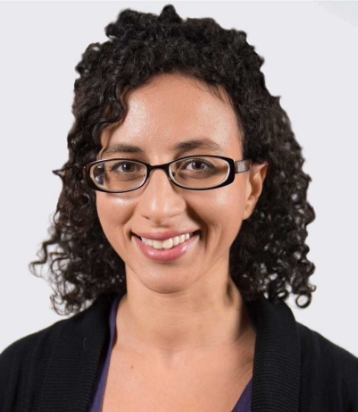
Sarah Stefanos is a researcher, social/environmental scientist and entrepreneur with more than a decade of experience working in Africa. Her research has focused on Ethiopia and Uganda and attends to questions of globalization, race and ethnicity, indigenous peoples, inequality, migration, work and entrepreneurship, politics and political economy, environment and natural resources, and development. Her interdisciplinary scholarship has been supported by the NSF-IGERT program, the Fulbright-Hays Program, the U.S. Borlaug Fellows in Global Food Security Program, the Advanced Opportunity Fellowship and the Wisconsin Energy Institute, among others. Stefanos is also the co-founder of W2E Ltd, a waste-to-energy research company in Uganda that specializes in biogas systems and technological/business innovations at the intersection of energy and agriculture. She received her PhD in sociology and environmental studies from the University of Wisconsin, Madison, where she is a member of the Bouchet Graduate Honor Society.
Mathematics
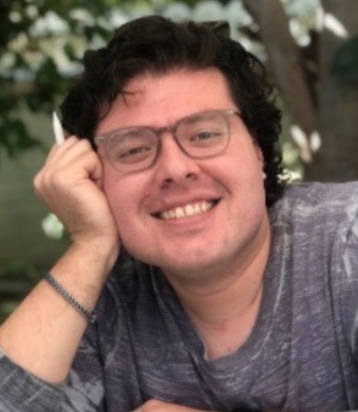
Andrés Vindas Meléndez has research interests in algebraic, enumerative and geometric combinatorics. His scholarly interests also include mathematical and computational approaches and applications of data science and mathematics for social justice. Previously, he was an NSF Postdoctoral Fellow and lecturer at UC Berkeley and a postdoctoral scholar at the Mathematical Sciences Research Institute (now the Simons Laufer Mathematical Sciences Institute). He was a research member for the SLMath fall 2023 program on Algorithms, Fairness and Equity and a research scholar at the Institute for Computational and Experimental Research Mathematics for the program on Data Science and Social Justice: Networks, Policy, and Education during the summers of 2022 and 2023. Vindas Meléndez completed his PhD at the University of Kentucky, where he also earned a graduate certificate in Latin American, Caribbean and Latinx studies.
